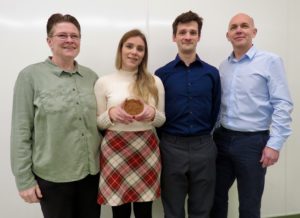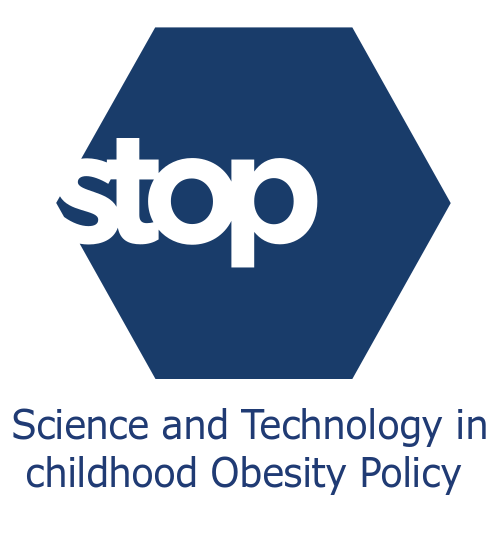Science & Technology in childhood Obesity Policy (STOP), a European Commission-funded Horizon 2020 project has funded three industry-led pilot projects in three European countries. Each pilot approaches the problem of childhood obesity from a different angle:
- The SWEET App, a mobile and desktop app, promotes physical activity and healthier food choices through identifying local community-based assets and by directly working with families with young children;
- FlavorID®, an online tool, collects information on taste preferences and nudges family’s towards developing healthy eating behaviours;
- Pennotec, has developed a high-fibre low-calorie dietary paste to extend meals and replace fat in school and home meals for children.
STOP, a four-year (2018-2021) research project funded through an EU Horizon 2020 grant, aims to generate scientifically sound, novel and policy-relevant evidence on the factors that have contributed to the spread of childhood obesity in European countries. The project seeks to develop a comprehensive set of indicators and measurement framework, policy briefs and toolkits and a viable multi-stakeholder framework to help address childhood obesity across Europe.
Based on the recent figures highlighted in the Global Atlas on Childhood Obesity, 158 million children between 5 and 19 years are living with obesity globally, a number that is predicted to increase to 254 million by 2025. New ways of addressing childhood obesity are urgently needed to support existing policies and known interventions to halt this anticipated rise in childhood obesity. In April 2019, the STOP consortium launched a call for industry-led projects aimed at developing innovations that have the potential to curb childhood obesity in Europe in three areas:
- New “food concepts” — Innovations with the potential to increase the availability, access to, and convenience of fresh and natural foods.
- Innovations in the food retail environment — Innovations in the in-store food choice environment.
- Digital solutions for healthier food and physical activity choices — Digital solutions that may help children, parents, pregnant women and women of childbearing age navigate their food environment.
With support from EIT Health and EIT Food in advertising the call, short-listed applications were interviewed by the consortium and three pilot projects received €150,000 of funding each to carry out their activities over a period of 18 months.
“The trends in childhood obesity show just how urgently we need to address this issue across Europe and we therefore need to use a combination of tried and tested policies in conjunction with innovative and novel technologies” says Professor Franco Sassi, Principal Investigator of the STOP Project and Professor of International Health Policy and Economics at Imperial College London.
SWEET App
 The Safe, Wellbeing, Eating & Exercising Together (SWEET) App is a community-focused obesity prevention and management tool. Through evaluating local community-based assets and working with families, this tool focuses on children from low-income families. Using the area of Creggan, Northern Ireland, as a pilot site, the app will be implemented before scaling to other European settings. Through an online tool and digital app, the project focuses on educating parents on healthier lifestyles for children through bite-sized, gamified content. Parents will have the ability to browse and self-refer themselves and their children into locally based community assets (programmes, services, events, etc.) focused on obesity prevention and physical activity.
The Safe, Wellbeing, Eating & Exercising Together (SWEET) App is a community-focused obesity prevention and management tool. Through evaluating local community-based assets and working with families, this tool focuses on children from low-income families. Using the area of Creggan, Northern Ireland, as a pilot site, the app will be implemented before scaling to other European settings. Through an online tool and digital app, the project focuses on educating parents on healthier lifestyles for children through bite-sized, gamified content. Parents will have the ability to browse and self-refer themselves and their children into locally based community assets (programmes, services, events, etc.) focused on obesity prevention and physical activity.
“The SWEET App will help parents gain the confidence, knowledge and skills they need to help their family adopt a healthier, happier lifestyle and to give their children a great start in life.” Julie White, SWEET Programme Manager, The Old Library Trust HLC
FlavorID®
 Foodpairing, a startup in Belgium, is developing an app that understanding people’s tastes and food preferences and uses this information to suggest new foods nudge people towards healthier food choices, with the goal of increasing the consumption of fruits and vegetables. While parents know that it’s important for children to eat fruits and vegetables, they also recognise the challenge in getting children to do so. FlavourID is a digital assistant aiming to develop healthy eating behaviour measured by the Healthy Eating Preference Index. It will store a family’s history, allergens and flavour preferences in order to provide individualised advice based specifically on taste.
Foodpairing, a startup in Belgium, is developing an app that understanding people’s tastes and food preferences and uses this information to suggest new foods nudge people towards healthier food choices, with the goal of increasing the consumption of fruits and vegetables. While parents know that it’s important for children to eat fruits and vegetables, they also recognise the challenge in getting children to do so. FlavourID is a digital assistant aiming to develop healthy eating behaviour measured by the Healthy Eating Preference Index. It will store a family’s history, allergens and flavour preferences in order to provide individualised advice based specifically on taste.
“Via its machine learning algorithms, Foodpairing is capable of extracting the flavour preferences of the family (FlavorID®) and linking it to recipes optimised for liking and fruits and vegetable consumption.” Bernard Lahousse, Foodpairing Founder
Pennotec
 Pennotec has launched a multi-disciplinary project that will develop a functional dietary fibre paste to provide a complementary approach to tackling childhood obesity across Europe. The project will address the barriers to introducing an ‘easy to use’ functional dietary paste, based on apple fibre, as a new ‘food concept’ for low-income families. By cooperating with schools and local communities, Pennotec will develop low-calorie versions of meals with no impact on texture or taste. The project’s aim is to develop an easy-to-use paste for both school and home kitchens as a healthier recipe supplement and a meal extender. The product will be delivered together with ‘on-package’ instructions and social media supported recipes and tips to make it easier and more affordable for families to prepare more filling and nutritionally balanced meals.
Pennotec has launched a multi-disciplinary project that will develop a functional dietary fibre paste to provide a complementary approach to tackling childhood obesity across Europe. The project will address the barriers to introducing an ‘easy to use’ functional dietary paste, based on apple fibre, as a new ‘food concept’ for low-income families. By cooperating with schools and local communities, Pennotec will develop low-calorie versions of meals with no impact on texture or taste. The project’s aim is to develop an easy-to-use paste for both school and home kitchens as a healthier recipe supplement and a meal extender. The product will be delivered together with ‘on-package’ instructions and social media supported recipes and tips to make it easier and more affordable for families to prepare more filling and nutritionally balanced meals.
“Pennotec aims to use innovative technology to develop a ready-to-use dietary fibre paste which can replace a portion of fat and sugar in foods enjoyed by children and families. This aligns with the need and demand of creating healthier new products using natural ingredients from sustainable resources”. Dr Jonathan Hughes, owner of Pennog Ltd. (Pennotec)
Over a period of up to 18-months, these three pilot projects will develop their innovations through subcontracts worth €150,000 from the STOP consortium. Additional support will be made available in the form of scientific advice and input from the STOP research partners. Each project will also be offered access to the EIT Health and EIT Food accelerator ecosystems, providing the support, skills and services that companies need to get their ideas off the ground and into the market. At the end of the 18 month period, each project will be evaluated by STOP to ensure it has achieved its aims and a final report will be published thereafter.
For more information about the SWEET App, visit https://www.facebook.com/SWEETProjectOLT/ or https://twitter.com/sweetprogramme?lang=en
For more information about FlavorID® info@foodpairing.com
For more information about Pennotec, visit www.pennotec.com
For more details regarding the STOP consortium please contact the Management team at: stop-management@imperial.ac.uk

